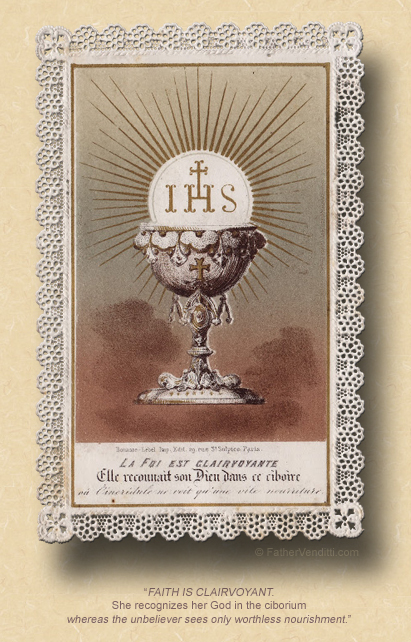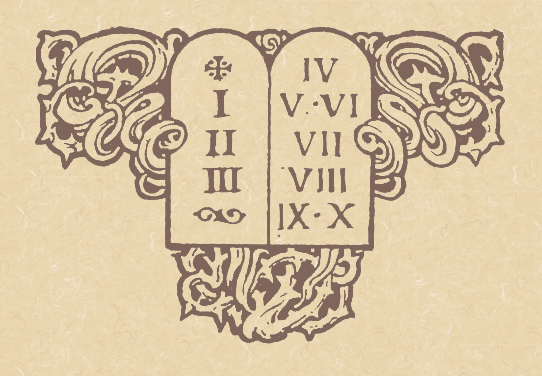How to Listen to God.
The Fifteenth Wednesday of Ordinary Time.
Lessons from the primary feria, according to the ordinary form of the Roman Rite:
• Exodus 3: 1-6, 9-12.
• Psalm 103: 1-4, 6-7.
• Matthew 11: 25-27.
The Fifth Wednesday after Pentecost; and, the Commemoration of Saint Alexius, Confessor.*
Lessons from the dominica,** according to the extraordinary form of the Roman Rite:
• I Peter 3: 8-15.
• Psalm 86: 10, 9.
• Matthew 5: 20-24.
|
When a Mass for the commemoration is taken, first lesson from the proper, the rest from the common of Confessors "Os justi…" of a Confessor not a Bishop:
• I Timothy 6: 6-12.
• Psalm 91: 13-14, 3.
• Luke 12: 35-40.
|
FatherVenditti.com
|
 7:24 PM 7/17/2019 — Today’s first lesson from Exodus is familiar—Moses hearing the voice of God from the burning bush—and highlights the subtlety with which God reveals Himself. Later on, in chapter 34, when Moses went to look for God again after hearing his voice, Exodus says, “The Lord came down to meet him, hidden in cloud” (Exodus 34: 5 Knox). When Elijah was told that God would be passing by, and went out to meet Him, he looked everywhere he thought God might be: he didn't find God in the mountain, he didn't find God in the earthquake, he didn't find God in the fire; he almost missed Him, finding Him where he would never have thought to look: in “the whisper of a gentle breeze” (I Kings 19: 12 Knox). The prophet Job described his own initial contact with God, saying, “Hidden from my sight, hidden from my thought, he comes and goes” (Job 9: 11 Knox). 7:24 PM 7/17/2019 — Today’s first lesson from Exodus is familiar—Moses hearing the voice of God from the burning bush—and highlights the subtlety with which God reveals Himself. Later on, in chapter 34, when Moses went to look for God again after hearing his voice, Exodus says, “The Lord came down to meet him, hidden in cloud” (Exodus 34: 5 Knox). When Elijah was told that God would be passing by, and went out to meet Him, he looked everywhere he thought God might be: he didn't find God in the mountain, he didn't find God in the earthquake, he didn't find God in the fire; he almost missed Him, finding Him where he would never have thought to look: in “the whisper of a gentle breeze” (I Kings 19: 12 Knox). The prophet Job described his own initial contact with God, saying, “Hidden from my sight, hidden from my thought, he comes and goes” (Job 9: 11 Knox).
And how many Gospel passages are there in which God, in the person of Christ, is just passing by someone, like the blind man sitting by the side of the road to Jericho (Luke 18: 35-37), or Zacchaeus who only hears that Christ is passing by and has to climb up a tree to try and get a better look (vs. 1-4). No lighting bolts, no blast of trumpets. God doesn't scream at man, He whispers.
The analogy of the Blessed Eucharist comes to mind: like every manifestation of our Lord, in both Testaments, the Blessed Sacrament is subtle: it still looks like bread and wine, it still tastes like bread and wine; put it under a microscope, and you'll see nothing unusual. It's not bread and wine, but that's how the miracle of transubstantiation works.
Now, all of this we all believe, otherwise we wouldn't be here at Holy Mass. The question is, do we recognize the irony of how often we ignore this in our daily life? All of life is a Eucharistic sacrifice; all of life is a Mass in the sense that God is continually speaking to us—showing Himself to us—in the circumstances of our state in life and our daily duties; but, as in the Blessed Sacrament itself, we don't see anything different or unusual about them. We keep looking for God in lightening bolts and listening for Him in some blast of trumpets. There aren't going to be any fireworks. If, like Elijah, we keep looking for God in the grandeur of nature or in some miracle that defies explanation, what are we looking for other than something that would make faith irrelevant? As our Lord said to the Blessed Apostle Thomas, “Blessed are those who have not seen, yet believe” (John 20: 29).
We all know how to recognize our Lord in the Blessed Sacrament; let's pray that we also may learn to see Him as Moses eventually did, as Elijah eventually did, in the whisper of a gentle breeze.

* Alexius, the son of the Senator Euphemian, renounced all earthly things and went to Palestine as a pilgrim. He returned after seven years and in his father's house was taken for an indigent beggar. There he died unknown in the year 404.
** In the extraordinary form, on ferias outside privileged seasons, the lessons come from the previous Sunday.
|

